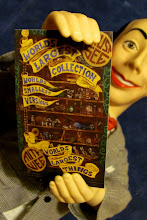Why the unending quest to get into Guinness?
By Greg Beato
At first glance, you might mistake Guinness World Records 2009 for a book-sized can of some energy drink. Its metal foil cover shimmers with such pulsating greenish-gold intensity it could give a disco ball a headache. Inside, its pages are jam-packed with factoids and photographs, including life-sized 3-D portraits of the world's tiniest man and the world's largest tarantula. Such touches are gimmicky but necessary: While the phrase "world record" once conveyed a sense of accomplishment so palpable no 3-D glasses were required to see it, those days are long gone.
The first edition of Guinness, then called The Guinness Book of Records, was published in England in 1954. As journalist Larry Olmsted recounts in Getting Into Guinness, his new history of the book that has sold more copies worldwide than any other title in history save the Bible and the Koran, it was the brainchild of Sir Hugh Beaver, a Guinness Brewery marketing executive who'd gotten into an argument over which European game bird was fastest — the golden plover or the grouse. When no reference volume readily yielded that information, Beaver saw an opportunity. Why not publish a book made up solely of facts about world bests? Beaver suspected it would be a big hit in his country's 81,400 pubs, where drunken patrons regularly jousted over such quandaries, and thus a great promotional item to emblazon with his company's name.
A year after its English debut, Guinness showed up across the pond. At a time when America was determined to put a man on the moon, end poverty and disease, and find a cure for black-and-white TV, The Guinness Book of World Records, as it would eventually be known here, was an apt companion piece for our optimism. It showcased the extraordinary feats human beings could accomplish. It encouraged the pursuit of elite achievement by broadening its domain — world records weren't just for sports anymore; they were for everything. It was a serious book, the product of a purposeful culture that still had faith in the power of Science, Industry and, most of all, Progress. The four-minute mile? We could break it. A skyscraper taller than the Empire State Building? We could build it. The future was surely going to surpass the past.
As it turned out, though, breaking the four-minute mile didn't cure cancer. Sending a man to the moon didn't end poverty. Things were getting better in some ways (cable TV, super-premium ice cream, infinite varieties of tennis shoes), but also worse (AIDS, homelessness, global warming, custom ringtones). Our faith in progress was eroding, and The Guinness Book of World Records was contributing to the malaise. Whereas it once championed elite achievement, it now trivializes it. Thousands of people want to earn a place in its pages as the world's best something-or-other, and Guinness, in need of new content to keep its annual updates fresh, is happy to accommodate them. For example, Guinness World Records 2009 includes entries for "Most snails on the face." And "Fastest time to push an orange one mile with the nose."
Instead of inspiring us, such pseudo-records merely remind us that we value publicity more than achievement now. They reinforce how purpose-driven our lives have become, how silly and trivial we are. Before Guinness, world records signified something important, the mastery of something that was considered worth pursuing, even if that something was no more ennobling of the human heart than competitive hamburger eating. After Guinness, world records didn't need to have a context, or a purpose, outside the context of Guinness itself. The goal is no longer to demonstrate the capacities of the human spirit; the goal is merely to get into Guinness.
In Missouri, attendees at a science fair recently broke the world record for blowing up balloons in one hour. In Germany, 15,000 puzzle fans assembled the world's largest jigsaw puzzle. As Wall Street implodes and the War on Terror percolates, we've pretty much stopped believing that tomorrow is going to be better than yesterday. At this point, we'll be ecstatic if Social Security lasts one week longer than the polar ice caps do. To distract ourselves from such depressing notions, we create the world's largest plastic duck, the longest ballpoint pen, the most expensive ice cream sundae, and Guinness treats these endeavors as if they're noteworthy achievements. In truth, they're all so meaningless that even drunken Englishmen have better things to argue about. • 26 November 2008






No comments:
Post a Comment